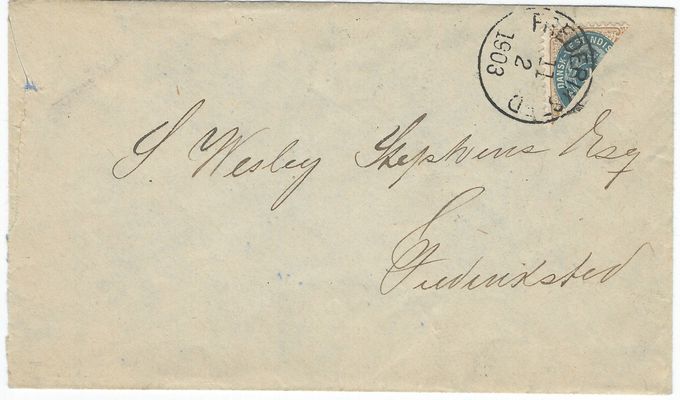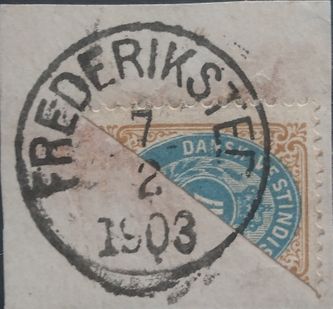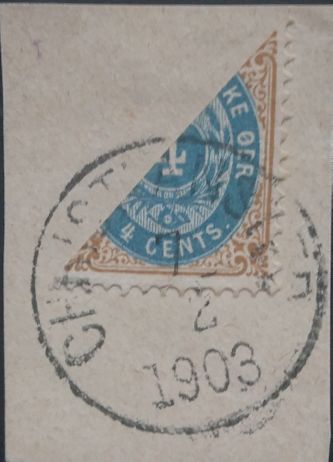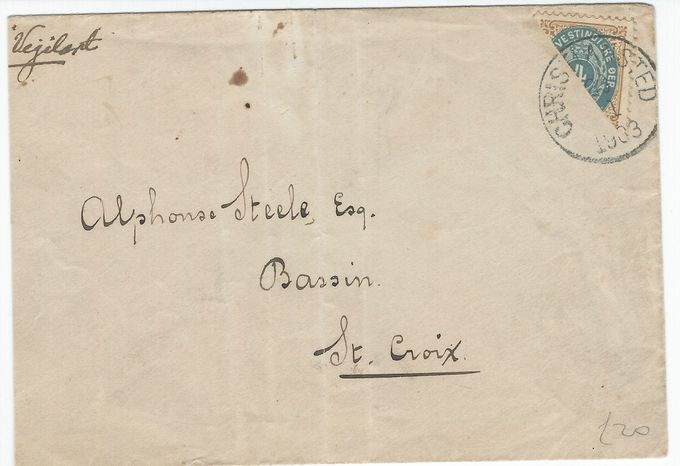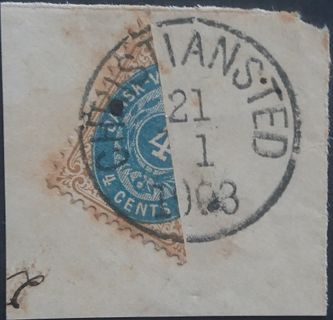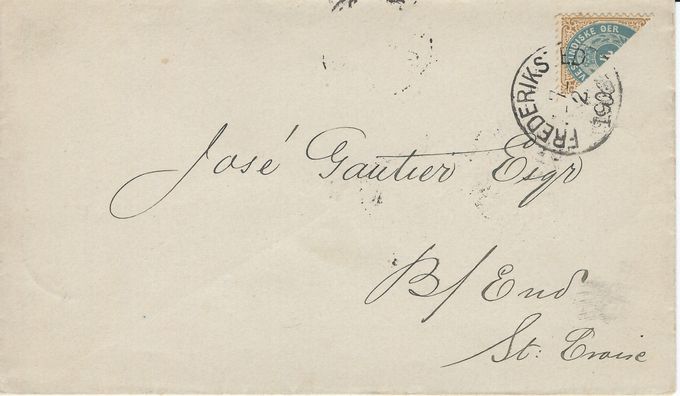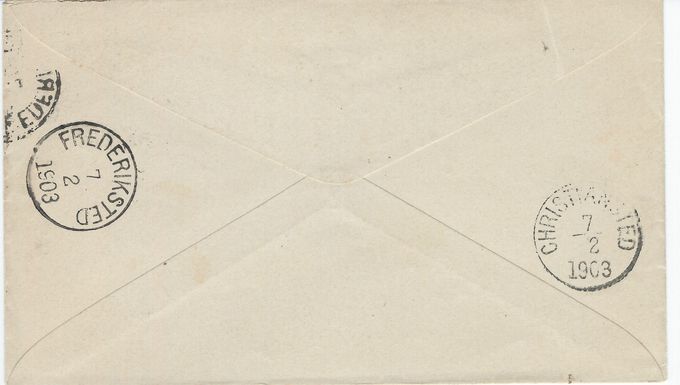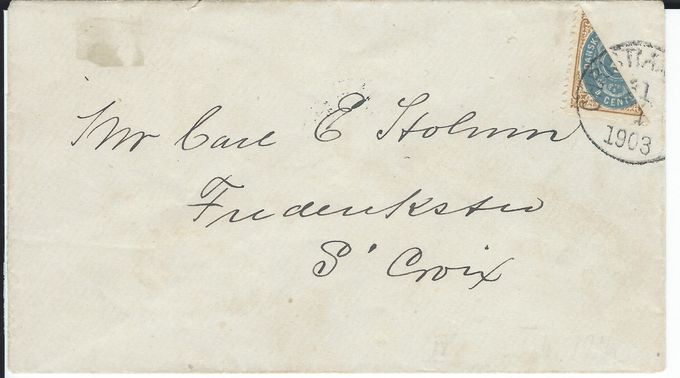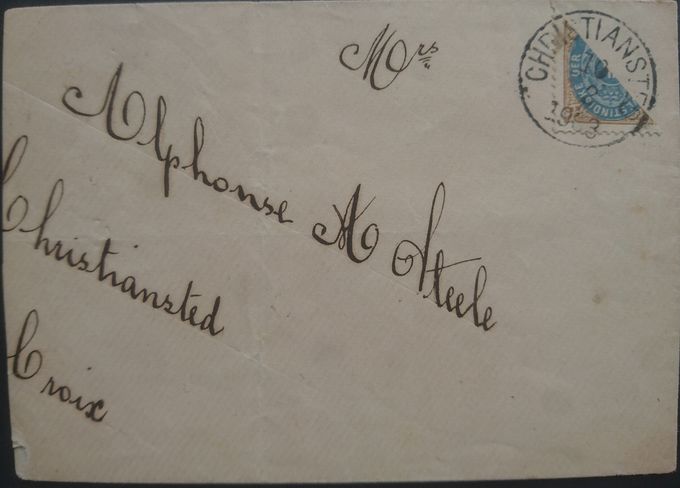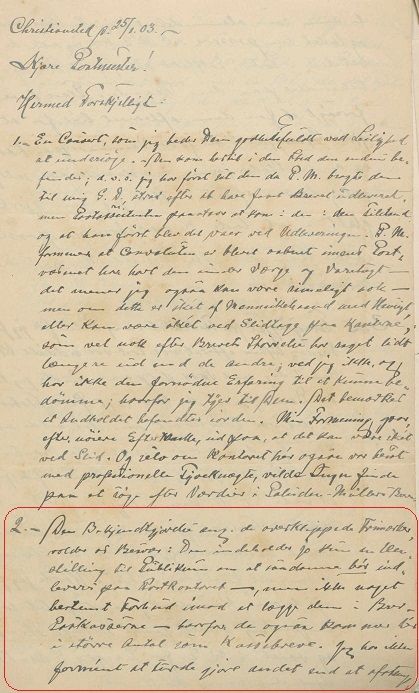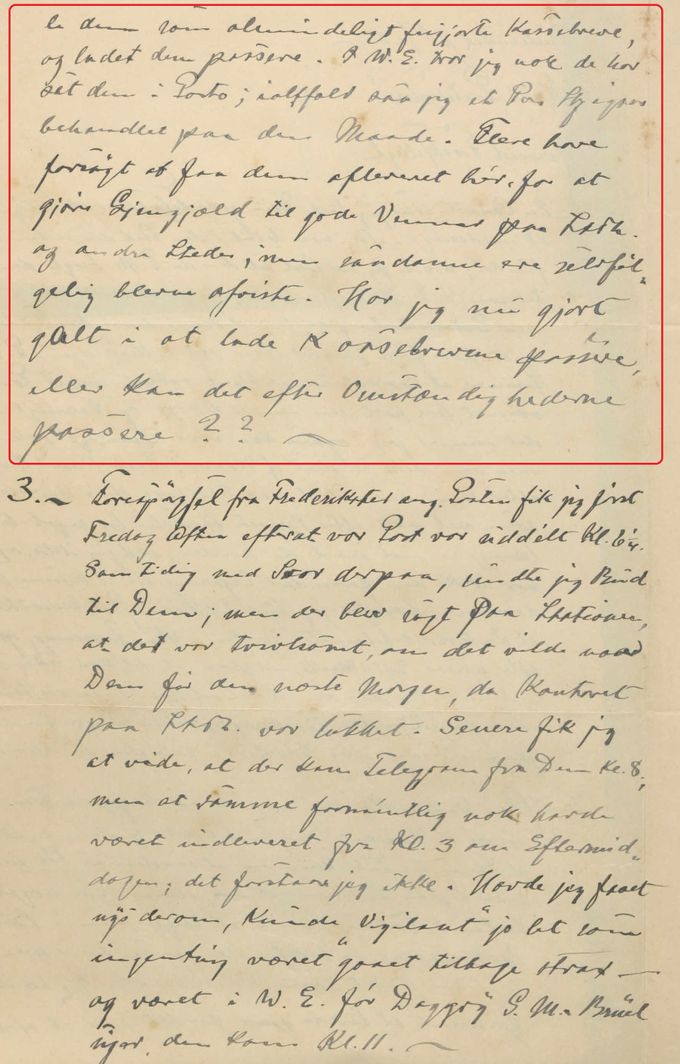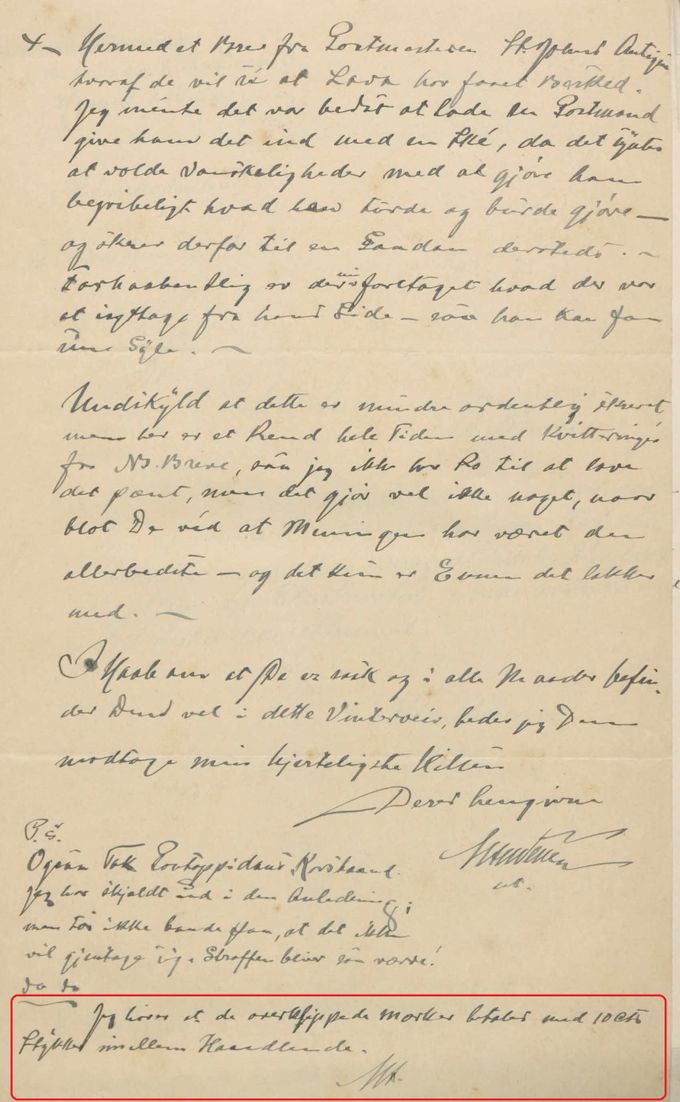POSTMARKS PREDATING FIRST DAY OF USE
First day of use - Frederiksted February 11 1903 - Printing 3. Sealed and then opened. A ten year search located tree St.Croix first day covers.
Partial cancelled Frederiksted February 7 1903 - before the first day of authorized use on St. Croix.
As mentioned earlier - the first day of bisected use on St.Thomas was January 20 and on St.Croix February 11.
Covers canceled on February 11 are extremely rare and the St. Croix post offices were sold out of 1 cent stamps about that date. The initial philatelic reaction observed at St.Thomas did not repeat itself on St.Croix. Three weeks had passed - and many covers had been mailed from St.Thomas - so the interest were likely to have dwindled.
Christiansted and Frederiksted both had smaller populations (approximately 1000 each) with lesser business activities as compared to St. Thomas - and only 20 percent of all the bisect covers were canceled on St. Croix.
Two St.Croix families, Woods and Armstrong accounted for approximately half of all the St.Croix covers. They also had many covers mailed from St.Thomas.
A total of 51 covers (part of the study material) with St.Croix postmarks were indexed, and 8 were addressed to someone named Woods and 19 to someone named Armstrong.
ST. CROIX CANCELS DATED EARLIER THAN FEBRUARY 11
Early postmark Christiansted February 7 1903. 4 days prior to first day of use on St. Croix.
The early cancels are the result of the post office practice associated with the use of public letter boxes located on board mail-carrying ships.
PLEASE ALSO REFER TO THE PAGE
This cover is send from St.Thomas to Christiansted. I have only located three covers dated January 23 with postmark Christiansted and one cancelled January 31 Christiansted.
Cancelled Christiansted January 21 1903. The earliest recorded cancel on St. Croix. This partial is unique.
The earliest recorded cancels from St.Croix is a partial cancelled Christiansted January 21 and covers cancelled Christiansted January 23 and Frederiksted February 7. All were mailed from St.Thomas without being canceled there.
In making this statement it becomes important to detail certain DWI Post Office practices to verify the origin of letters mailed in 1903 and how the domestic mail routing is determined by examining the multiple postmarks on an envelope.
Covers are commonly seen with the cancel from one post office on the stamp, and up to two different cancels on the back of the envelope. The stamp was canceled by the first post office to receive the letter, and the cancels on the back are a combination of transit and arrival cancels.
Mail from Frederiksted to St.Thomas will have the stamp canceled in Frederiksted. From there it went by mule cart to the Christiansted Post office that backstamped the mail and then by ship to Charlotte amalie where the St.Thomas cancel was backstamped. Alternatively - mail could have travelled by ship directly to St.Thomas and the back of the cover would only have a St.Thomas cancel.
EARLIEST REPORTED FREDERIKSTED POSTMARK - February 7 1903
This letter was deposited in the letterbox on board the mail schooner “Vigilant” while it was at the Charlotte Amalie harbour, most likely after the closing hours of the Post Office. It was delivered to Christiansted Post Office the next morning. There by mistake - it was only backstamped and sent to Frederiksted without the stamp being canceled. The Frederiksted Post Office also considered the stamp properly used and cancelled it - since it was mailed in St.Thomas where bisect stamp use had been authorized since January 20.
Backstamped both Christiansted and Frederiksted February 7.
Letter box practice - letter canceled Christiansted January 31, and sent to Frederiksted - backstamped Frederiksted January 31.
Cover cancelled Christiansted February 10 1903 - the day before first day of use in Christiansted. This cover has been cut and reduced. Note the address was written diagonally. I have 3 covers addressed to the Christiansted residing Steele family - predating first day of use.
CHRISTIANSTED POSTMASTER LETTER TO THE ST. THOMAS POSTMASTER REGARDING BISECTED 4 CENTS IN LETTERBOXES JANUARY 25 1903
This document is recovered from DWI archives at the Danish "Rigsarkivet".
POSTMASTER CHRISTIANSTED: Marcus Andersen
POSTMASTER ST. THOMAS: Julius August Jensen
In Danish: (English translation coming soon)
"Den bekjendtgørelse ang de overklippede frimærker volder os besvær: Den inde..reder jo kun en henstilling til Publikum om at sådanne BØR indleveres paa Postkontoret-, men ikke noget bestemt forbud imod at lægge dem i Brevpostkasserne-, hvorfor de også kommer til i større antal som korsebreve. Jeg har ikke forment at turde gjøre andet end at afstemple dem som almindeligt frigjorte korsebreve, og ladet dem passere. I W.E. (Westend - Frederiksted) tror jeg nok de har sat dem i porto, i altfald så jeg et par ..... behandlet på den måde. Flere har forsøgt at faa dem afleveret her, for at gjøre gjengjæld til gode venner på St. Th (St. Thomas) og andre steder, men sådanne ere selvfølgelig bleven afviste. Har jeg nu gjort galt i at lade korsebrevene passere eller kan det efter omstændighederne passere?"
In Danish:
PS...."Jeg hører at de overklippede mærker betales med 10 cts stykket imellem handlende".
Del siden
